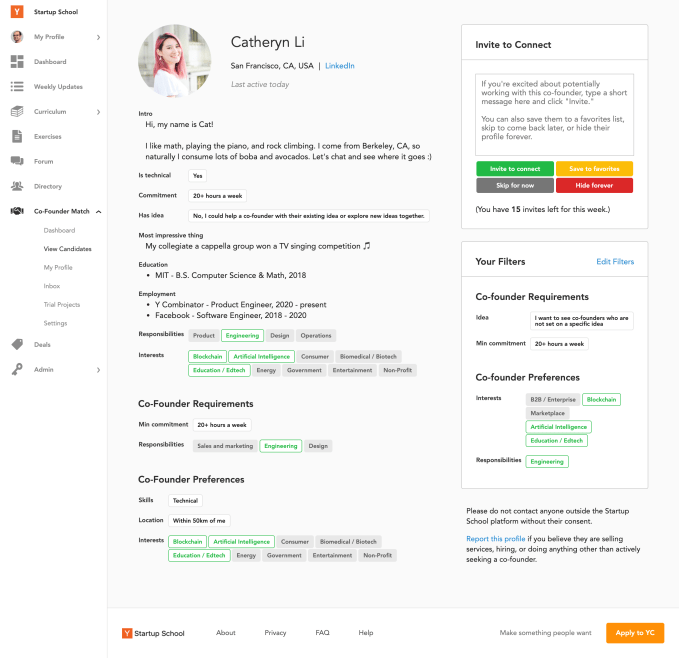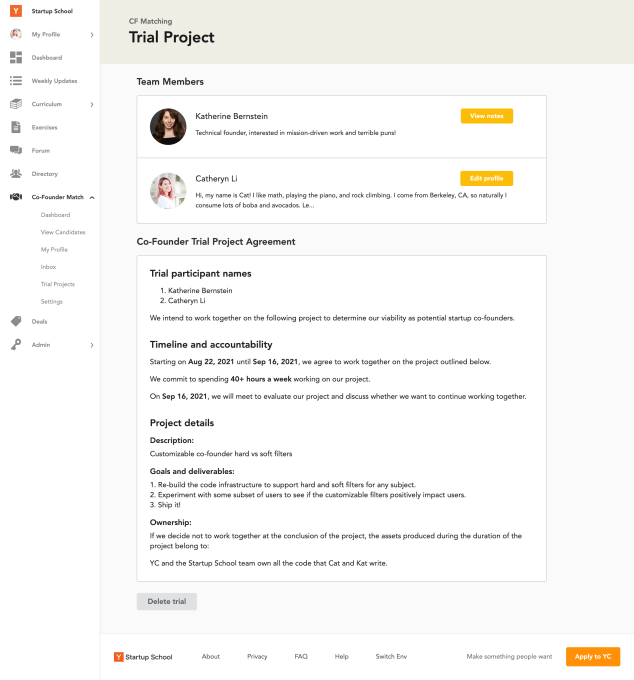If I went to Stanford and worked with some YC-backed startups, chances are that I’ll find it relatively easy to find one or two co-founders, get millions in funding and build a billion-dollar company.
However, as someone who grew up in Lagos, Nigeria, and studied at the University of Nigeria, those chances are much slimmer, and it’ll be hard to find the same resources to build a successful company.
When Y Combinator began Startup School as an in-person program for early-stage founders launching a company, it catered to the first set of privileged founders. But it then decided to level the playing field a bit by taking the program online so founders from other parts of the world could participate.
The free program, which provides a similar curriculum to YC’s main content used during its biannual startup batches, amassed more than 300,000 participants.
Startup School has a Q&A session every Monday where new members of the program join in for the first time. After several meetings, those in charge of the program noticed they needed to solve another problem.
“The most common question we get is where do I find a co-founder? How do I find the right co-founder? How to find a tech co-founder? So it was just very obvious to us that it’s a huge problem for people,” Catheryn Li, product engineer at Y Combinator, said in an interview. “I think something like 20% of our active founders are actively looking for a co-founder and that’s across our 300,000 founders.”
So, the team began testing a co-founder matching platform with some early users in January this year and it went live in July.
When aspiring founders come to the platform, they describe themselves and the kind of co-founder they need. The platform then offers a pool of candidates who might be a good fit for the aspiring founder. If their requirements overlap and mutual interest exist on both ends, a connection is made.

YC Startup School
For example, if an aspiring founder with an engineering background is looking for a sales/marketing co-founder, the other person would have to be a sales and marketing co-founder interested in an engineering co-founder.
In the three and half months YC’s co-founder matching platform has been live, more than 16,000 co-founder profiles have been created. These founders have sent 130,000 matching invites; with a 25% acceptance rate, the platform has made 33,000 matches.
Although it’s too early to determine the platform’s long-term results, TechCrunch spoke with Li and Kat Mañalac, YC’s head of outreach, to discuss a few short-term trends — some surprising and some not.
Location
The matching platform received profiles from 146 countries — 40% from the U.S. and 60% from 145 countries.
The pandemic and a new work-from-home culture have fundamentally changed how founders think about location when choosing a co-founder. Assuredly, it is an incidental attribute — according to the report, 50% of the founders do not care where their co-founder resides.
“When we started creating this platform, we assumed that it’d be really important for someone to find a co-founder that’s nearby so that they can meet up in person,” Li said. “But it turns out people don’t care about that anymore.”
Further breakdown of founders’ location shows some similarity between a typical YC batch and the countries represented in the matching program.
For instance, the biggest representative outside the U.S. (both in this matching platform and YC’s most recent batch) is India. The South Asian country accounts for 14% of the profiles, followed by the U.K., Canada and Nigeria.
On the other hand, a continental breakdown looks like this: North America, 46%; Asia, 23%; Europe, 21%; Africa, 6%; South America, 3%; and Australia, 2%.
But matches performed on the platform tell a different story as founders have found partners in close proximity. Of the matches made so far, 55% are founders located in the same country, 69% are between founders in the same continent, while 61% of matches are from founders located within three time zones of one another.
Shared interests and skills
If founders care less about the location of their business partners, then what do they care about the most? Per the report, 79% of the profiles want their co-founder to commit to a certain number of hours for a few weeks into a project, while 74% prefer to have shared interests with their co-founder.
Shared interests, in this case, are synonymous with the industries or sectors generally known in the startup world, from blockchain and e-commerce to fintech and hardware.

YC co-founder matching platform
Profiles are allowed to select several interests on the matching platform and the most selected ones are almost identical to the categories on a typical YC batch: 36% of the founders selected B2B/enterprise; 34% picked consumer; 34% chose AI; 32% indicated an interest in the marketplace category; while 29% chose fintech and e-commerce.
To build in any of these sectors, founders need skill, and on the matching platform, five skills are held in high regard — product, design, engineering, sales and marketing, and operations.
It’s not surprising which skill is in the highest demand: engineering. According to the report, 63% of founders on the platform want a co-founder who does engineering. Even engineering founders want engineering co-founders: 44% of engineering founders prefer an engineer co-founder, the report said.
For other skills, 42% of founders want a product person; 39% prefer a design co-founder; 37% are better off if they find a co-founder who does sales and marketing; while 28% want a co-founder skilled in operations.
More work to be done for underrepresented founders
A widespread consensus held in the startup world is that it’s best to work with someone you’ve known for a while, maybe a friend or colleague, when looking for a co-founder.
An article by Harvard Business Review in 2011 says, “a long-term relationship can help you leapfrog the learning curve of the close collaboration, which can sometimes take years to develop.”
On the surface, YC’s co-founder matching platform does not seem to regard this advice. One Twitter user called it “co-founder dating” and said YC lecturers in Startup School frown on the idea.
But Li explains that the matching platform has a pretty different model from other co-founder dating platforms.
“I do think that the typical advice that you should have met your co-founder a long time ago is less about the length of time and more about the fact that you are really comfortable working with them and you understand their working styles,” she said.
She adds that YC recommends that when two profiles match, they should not become co-founders immediately in the program. Instead, YC presents an opportunity for them to figure out each other’s personality and compatibility by pitching them with a trial project to work on for weeks or even months together.
In the project, clearly defined scopes and expectations are set so matched profiles can figure out each other’s working styles and compatibility.
Though it’s too early to say, the model seems to be working. Of the thousands of companies founded on the platform, 50 of them applied to the Y Combinator Summer batch — and three got in.
One of the startups is Sequin, a fintech that builds a debit card for women to build credit. The founders, Vrinda Gupta and Mark Thomas were some of the early testers of the matching platform.
CEO Gupta is one of the 13% of profiles that identify as a woman. The percentage reflects the global underrepresentation of female founders, but Mañalac believes YC’s matching platform will help close that gap.
“How to find a co-founder is one of the most common questions we get, especially from women who are solo founders. And, so we’re hoping that this is one way that we can help increase the pipeline of women that can start companies and get funding.”
She also hopes more aspiring underrepresented founders in international markets get to know about the platform. That way, they “can meet more people who are interested in building and hopefully one day start a company with them.”
YC alumni also see value from the platform. Li recounted an instance where a female founder from the winter batch this year got a technical co-founder via the matching platform — barring her, over 150 alumni are using the platform to find new co-founders with whom they can start a new company.
Credit: Source link


Comments are closed.